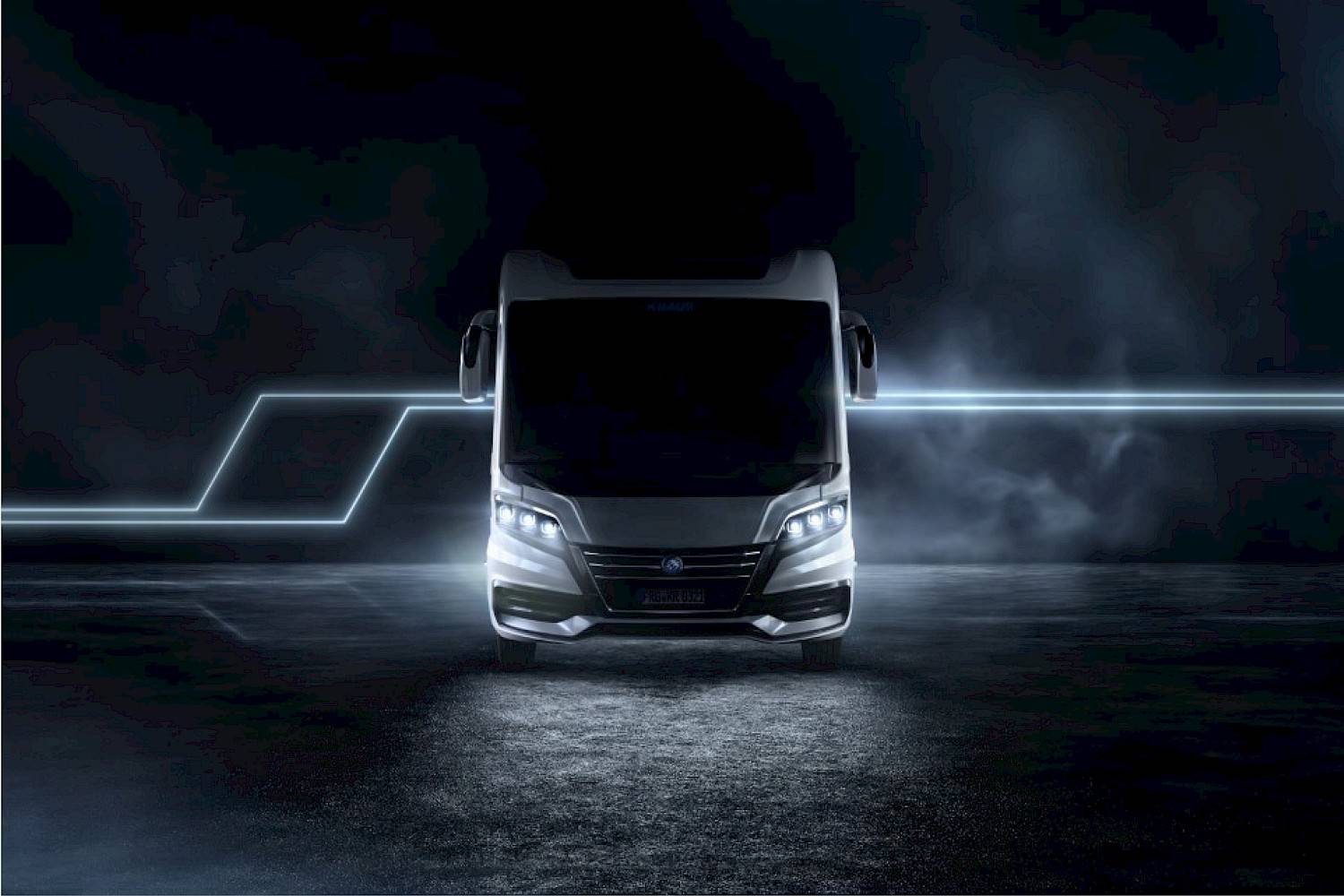
What to keep in mind when storing your motorhome
Now that it's getting dark earlier in the evening, it is time to prepare our lovely traveling companion for his winter nap. To avoid unpleasant surprises in the spring, it is best to take a number of things into account before storing your motorhome.
The battery, the heart of your motorhome, in particular deserves the necessary attention. But it is also best to choose a specific approach for the tires, water installation and gas bottles. In this blog you can read all the tips and tricks so that you can leave your camper behind with peace of mind.
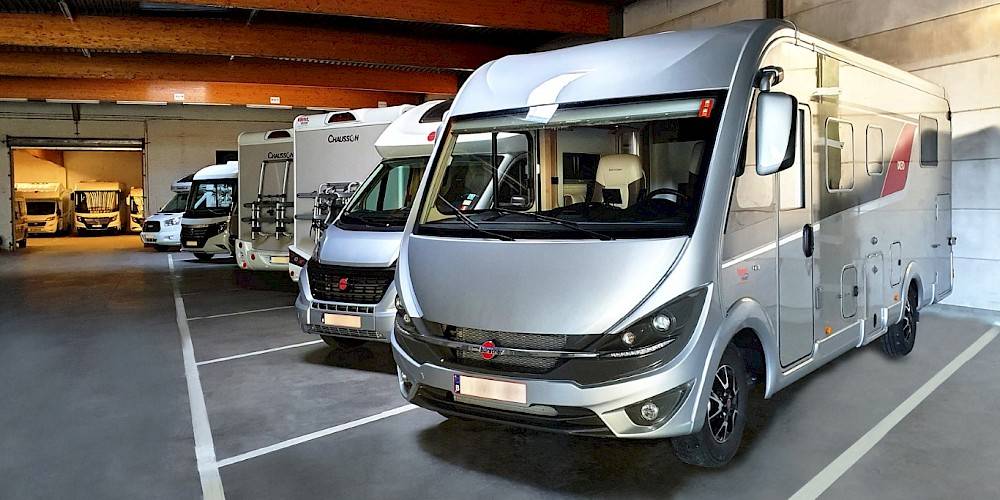
About the batteries
The (residential and starter) batteries are the heart of your motorhome and you can take that literally: the most crucial and at the same time the most vulnerable part. To enjoy your camper for years to come without any worries, it is very important that you maintain the batteries properly. Things can sometimes go wrong when you store you motorhome during winter. After all, the batteries undergo natural discharge: they continue to lose voltage every day, even if they are not used. If the battery voltage drops below a certain critical level, the battery will sulfate, causing irreparable damage. A damaged battery will give a normal first impression when charging, but when used, the battery will discharge again in no time. Leaving your camper on power all the time is also not a solution, as it can overcharge your batteries or cause damage to the charger and the electrical circuit. And not unimportant to mention: damage to batteries is not covered by warranty or insurance.
The only correct solution to prevent damage is to regularly charge all batteries in the motorhome:
- The residential battery: we recommend connecting the camper to the grid every 3-4 weeks for 24 to 48 hours.
- The starter battery: we recommend connecting a trickle charger directly to the starter battery during the standstill.
Is your motorhome equipped with a solar panel?
Solar panels can provide sufficient energy to compensate for the natural discharge (for a number of weeks). The only conditions are that the batteries are fully charged before it is placed in storage and that it is placed in a place where it can receive sufficient sunlight. However, the solar panels only supply the residential batteries, so you have to regularly charge the starter battery yourself.
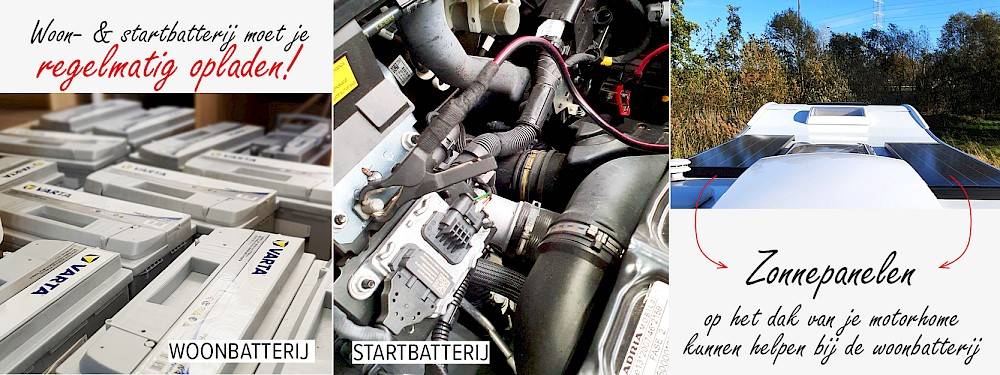
About the tire pressure
If your motorhome is stationary for several months, slight deformation of the tires may occur, which can lead to a blowout. Ideally, you raise the wheels off the ground, but in practice that is not that easy. The second best option is to increase your tire pressure before storage. The extra 0.5 to 1.0 bar reduces the chance of deformation of the tires. Also make sure that the motorhome is as level as possible (see also the next point).
Please note: be sure to check the maximum pressure that can be put on the tires; this must not be exceeded under any circumstances.
About the handbrake and gears
Do not apply the handbrake and do not leave the camper in gear! It's best to turn off the handbrake, put the clutch in neutral and use stop blocks so it doesn't go anywhere.
If you apply the handbrake when your motorhome is stationary for a long time, it could become "sticky" to the brake drum, which could mean that it needs to be replaced. Leaving the camper in gear can damage the gears of the gearbox after a long time. None of the above issues are covered by warranties or insurance.
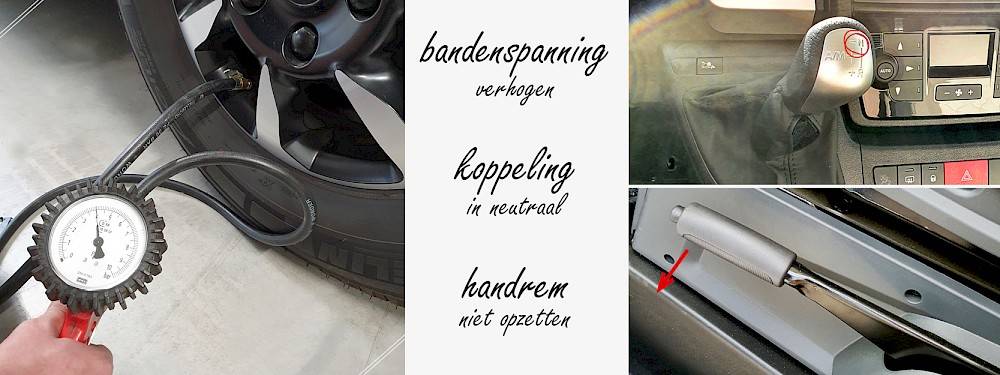
About the fuel
Store your motorhome with a full diesel tank. This prevents condensation from forming. Also take freezing temperatures into account and make sure you fill up with winter diesel. Gas stations automatically switch to winter diesel as soon as the winter period is in sight. Summer diesel contains paraffin, which "flakes" in cold temperatures, disrupting the fuel supply.
About the water installation and boiler
Algae and bacteria grow in stagnant water and you want to avoid that at all times. To prevent this, we recommend draining, rinsing and ventilating the entire water circuit (including tanks, toilet cassette, pipes and boiler).
Open the frost protection (frost control) and open the drain taps. Then turn on the water pump for a few more seconds to empty the last remnants of water in the circuits and the ceramic heads of the tap. Turn off the power to the water heater pump using the button on the panel. Leave the taps in the kitchen and bathroom open at the neutral temperature setting to allow air to enter the pipes and tanks. This is the ideal situation to leave your camper in winter storage.
Caution: Do not let the pump run for more than a few seconds, otherwise serious damage may occur.
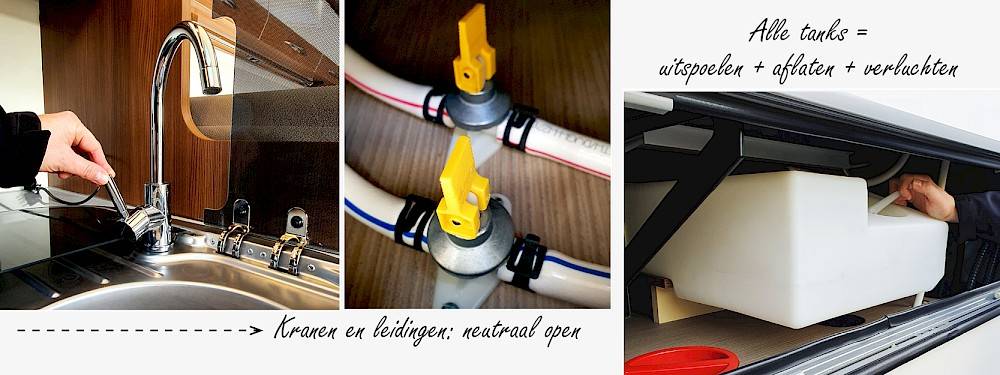
About gas bottles
The safest option is to disconnect the gas bottles. Turn on the gas fires for a moment so that all the gas is out of the pipes. In some storage areas you are not even allowed to leave gas bottles behind.
About humidity in the camper
Moisture is also a big enemy of your motorhome. It is important that you can store the camper in a dry place and that you take a number of measures to prevent moisture (problems). By leaving windows open, you provide ventilation, which is enough to keep humidity down. The disadvantages are that open windows can attract both burglars and critters, so we generally do not recommend this.
Moisture absorbers are a good solution. Be sure to place enough (one at the front and one at the back, possibly also one in closed areas such as the bathroom). They help keep humidity down. Don't take any risks and place your curtains, pillows and mattresses in a dry place at home. If that doesn't work, make sure there is some space between the mattress of your pull-down bed and the ceiling, adjust your pillows and close the curtains.
Also leave all closed spaces (such as cupboards and the refrigerator) open.
Please note: leave the blinds and screens open, it is bad for the springs to leave them closed.
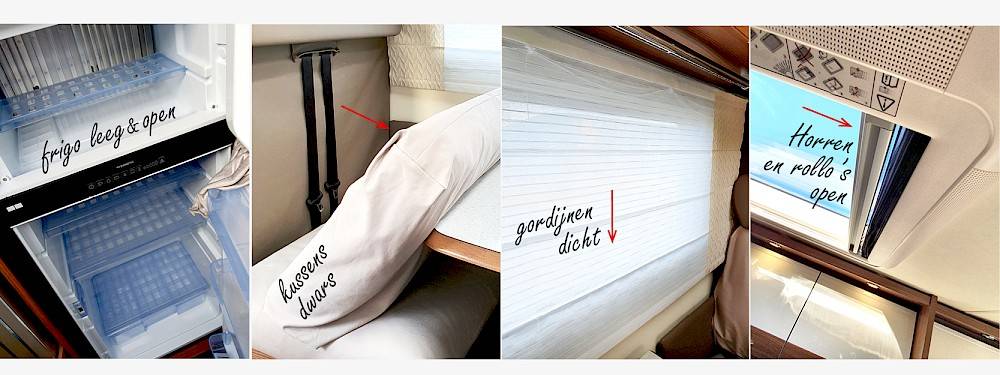
About the rest
- Insert a cork between your windshield wipers to prevent deformation of the blades
- Leave the camper tidy and remove all products that could spoil, freeze or attract vermin from the camper. Also, don't leave any valuables behind.
- Plastic bag around gas pressure regulator: put a plastic bag around the gas pressure regulator and put an elastic band around it again. This way, no dust or dirt can get into your gas hoses.
- Stiff locks? Spray a little graphite powder or WD40 into it to prevent the locks from moving. Do not use silicone spray as this may damage the mechanism of the lock.
Are you coming to our workshop for inspection or maintenance in the autumn? Please feel free to ask us if we would like to prepare your motorhome for winter immediately. This way you immediately have half the worries.
Any questions? Please feel free to contact our after-sales service via info@vanomobil.be or by telephone to the workshop in your area (Deerlijk, Hoogstraten or Tremelo).



